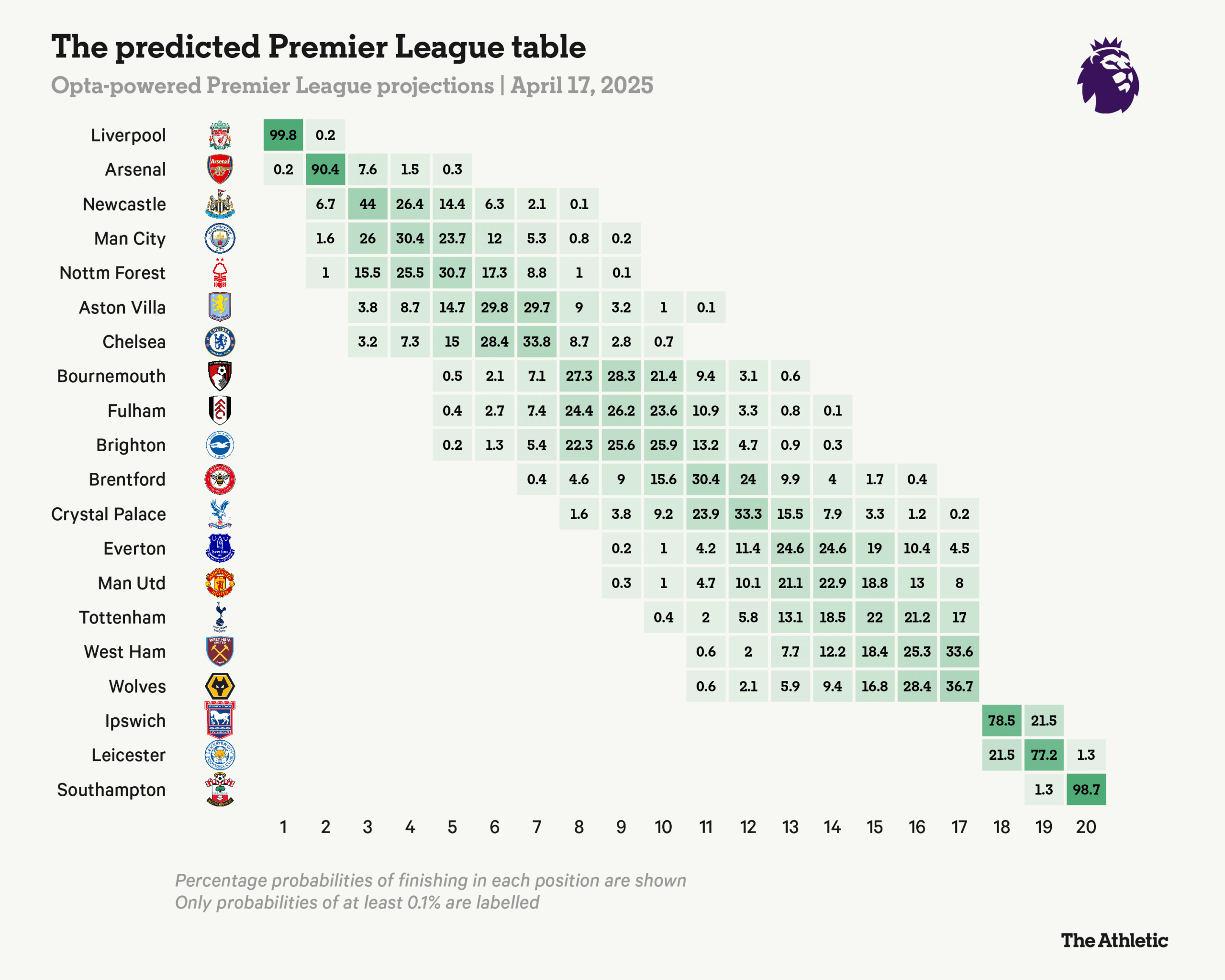If Premier League fans needed a reminder of just how magnificent European football can be, then this week delivered.
Aston Villa pushed Paris Saint-Germain all the way in their Champions League quarter-final; Arsenal put in another sensational performance against Real Madrid to humble the European champions; Tottenham went to Frankfurt in the Europa League and won a game; Manchester United completed arguably the greatest-ever period of extra time English football has ever witnessed to get past Lyon in the same competition, and, er, Chelsea completed their Conference League tie with Legia Warsaw.
Advertisement
It’s mid-April and continental football is in its absolute pomp.
But how many sides will represent the Premier League across UEFA’s three competitions next season?
With so many moving parts it’s not a simple question to answer, but we will try.
How many Champions League slots are available?
This used to be a simple one, didn’t it? After all, there’s a reason ‘finishing in the top four’ has firmly become part of the English football lexicon. But things have changed, possibly more than you think.
First, there was the news that the Premier League had secured one of UEFA’s two European Performance Spots (EPS), awarded to the two domestic leagues who have performed most successfully in coefficient terms during 2024-25. So that’s now five Champions League berths for the Premier League, hence the focus on the gripping top-five battle that’s currently in progress.
But it doesn’t end there. The winners of the Europa League also get a Champions League place for the following season, and there are two Premier League sides in the semi-finals of that competition, with neither side — Tottenham Hotspur or Manchester United — likely to finish in the top half of the table.
So you’re saying we could have a Champions League play-off between Spurs and United in Bilbao next month?
I suspect UEFA would still prefer it to be called ‘The Europa League final’ but yes, that is a situation that is looking increasingly possible, albeit the two clubs need to get past Bodo/Glimt and Athletic Club respectively.
Tottenham celebrate scoring against Frankfurt on Thursday (Alex Grimm/Getty Images)
So that’s six Premier League teams in the Champions League next season?
Well, yes… but it could be seven.
Wait, what?
You need to remember that the EPS position is a separate route into the Champions League than the standard top four, so if Arsenal finished fifth (it’s highly unlikely but what if Mikel Arteta’s became so consumed by chasing European glory that their domestic form fell apart?) but won the Champions League then the EPS award would go to the team in sixth place. Combine that with a Premier League team winning the Europa League and England would then have seven representatives in what used to be known as the European Cup in 2024-25: the top four, defending champions Arsenal, sixth place plus one of Manchester United or Tottenham.
Advertisement
That would mean 19.4 per cent of sides in next season’s Champions League would be from the Premier League
Good maths but, as I say, file under: highly unlikely.
What about the other European competitions?
Usually, English football gets three other European spots, two in the Europa League and one in the UEFA Conference League. The Europa League berths are handed to the FA Cup winners and the highest Premier League finisher who doesn’t qualify for the Champions League. Then the Carabao Cup winners get the Conference League spot.
So that’s nine, possibly 10 Premier League sides in Europe next season…
You’d think so, but guess what, it’s not quite as simple as that. First, Newcastle won the Carabao Cup but look increasingly likely to qualify for the Champions League via their league position, so that Conference League place switches to a Premier League finisher. Then we have teams remaining in this season’s FA Cup. Three of those (Nottingham Forest, Manchester City and Aston Villa) all have reasonable shouts of qualifying for the Champions League via their league position, so that would mean the FA Cup slot would also shift over to a Premier League finisher.
The fourth side, Crystal Palace, should just focus on winning the cup and qualifying for the Europa League the way God, or rather UEFA, intended.
There is an incredibly unlikely scenario where 11 English teams could be involved in Europe next season but it would involve, among several other factors, Arsenal completely collapsing in the league.
What happens if Chelsea win this season’s Conference League?
The winners of the Conference League get a spot in the following season’s Europa League (meaning football has its own version of snakes and ladders where a club can theoretically win the Conference League, Europa League and Champions League in successive seasons, all while not worrying about league position, but that’s not something we need to concern ourselves with now), but Chelsea are aiming to qualify for the Champions League, in which case their Europa League berth as Conference League winners will not be taken up.
But if Chelsea finish outside the Champions League positions (so, realistically, sixth or lower — and the Opta supercomputer has them likely finishing seventh as it stands), then they will enter the Europa League.
Can we work through some hypotheticals here?
Let’s imagine a situation where every Premier League side finishes in the position Opta predict them to in the graphic above, plus Manchester City win the FA Cup, Manchester United win the Europa League and Chelsea win the Conference League. In that scenario, next season’s European spots will be distributed as follows:
Champions League: Liverpool, Arsenal, Newcastle, Manchester City, Nottingham Forest, Manchester United
Advertisement
Europa League: Aston Villa, Chelsea, Bournemouth
Hang on, where’s our Conference League slot gone?
Ok, this is where it gets even more complicated. If a team winning a European trophy also finishes in a European spot in the league (so seventh in this example for Chelsea would be a Europa League-qualifying position if Palace don’t win the FA Cup) then the Premier League would give up its Conference League spot. So in this example, Villa (sixth) and Bournemouth (eighth) would qualify for the Europa League, plus Chelsea would be in there as 2024-25 Conference League winners.
But if Chelsea finish in eighth (or lower) then we would have a scenario where sixth and seventh would qualify for the Europa League on league position, Chelsea would get into it via their Conference League win and then the Premier League’s Conference League spot would go to the team in ninth — currently Fulham.
So Fulham fans need to hope Chelsea’s form continues to suffer?
In domestic football, yes. And handily the two clubs play each other on Sunday. Also, Chelsea have one of the hardest remaining schedules…
This is way more exciting than I imagined
Some would say so, yes.
(Top photo: OLI SCARFF/AFP via Getty Images)












